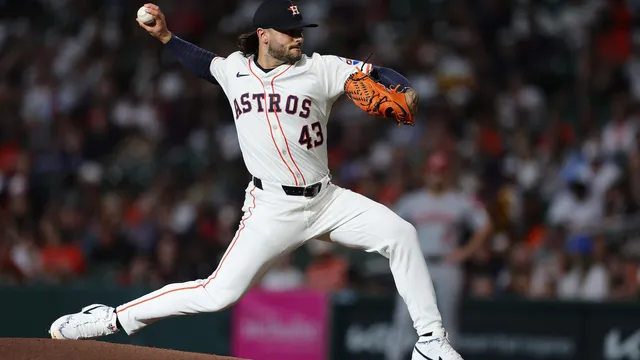
Lance McCullers Jr. faces death threats toward his family after rough start
2025-05-11 09:57- Lance McCullers Jr. received online death threats directed at his children following a poor performance against the Cincinnati Reds.
- The Astros organization, along with McCullers and his wife Kara, have been alerted to the threats while they care for their two daughters.
- This situation highlights the troubling tendencies of some sports fans and the emotional toll on players and their families.
Express your sentiment!
Insights
In Houston, Texas, on Saturday night, Houston Astros pitcher Lance McCullers Jr. experienced a challenging outing against the Cincinnati Reds, where he allowed seven earned runs in just one-third of an inning. This was his second start since returning from injuries that had sidelined him since the 2022 World Series. The Astros ultimately lost the game 13-9, which stirred up strong emotions among fans. Unfortunately, some fans reacted to McCullers' performance with extreme hostility, resulting in McCullers receiving online death threats targeting his two young daughters. Following the game, McCullers spoke to the media, expressing the emotional toll that such threats take on him as a father. He stated, "I understand people are very passionate and people love the Astros and love sports, but threatening to find my kids and murder them is a little bit tough to deal with." The threats suggested violent actions against his children, which McCullers noted have occurred multiple times throughout his career but emphasized that bringing his family into such threats crosses a line. McCullers has faced a tumultuous season, with his performance being scrutinized due to his struggles with injuries and his attempt to regain his form on the mound. Astros manager Joe Espada publicly spoke out against the death threats directed at McCullers' family, expressing his frustration and sadness that such issues arise in the sport. He highlighted the unfortunate reality that a player’s performance could lead to threats against their family, saying, "It is very unfortunate that we have to deal with this. After all he’s done for this city, for his team, the fact that we have to talk about that in my office — I got kids too and it really drives me nuts that we have to deal with this. Very sad, very, very sad." The Houston Astros organization responded to the situation by notifying both the Houston Police Department and Major League Baseball security about the threats received by McCullers. The support from the organization reflects a recognition of the serious nature of online threats and the need to ensure the safety of players and their families. McCullers is determined to focus on returning to form as a pitcher while coping with the stressful situation surrounding his family. As a father, he emphasizes the importance of decency in sports and hopes for a healthier environment for all involved.
Contexts
The impact of fan behavior in sports is a multifaceted issue that encompasses emotional, psychological, and social dimensions. Fans are often seen as the lifeblood of sports, providing essential support and financial backing to teams through ticket sales, merchandise, and sponsorship deals. The passion exhibited by fans can elevate the atmosphere during events, creating a sense of community and belonging among spectators. However, this same fervor can manifest negatively, leading to behaviors that disrupt games, create tension among rival groups, and even result in dangerous or violent situations. The dual nature of fan behavior necessitates a better understanding to ensure the safety and enjoyment of all stakeholders involved in sporting events. Positive fan behavior can significantly enhance the experience of players and teams alike. Engaged supporters can motivate athletes to perform at their best, while the collective cheers of a devoted crowd can serve as a psychological boost during crucial moments in a game. Furthermore, social media has become an extension of fan engagement, where supporters can interact, share their experiences, and even influence public perception of teams and athletes. Positive gestures, such as organized cheers or displays of creativity, contribute to an electric atmosphere that is often referenced as a 'home-field advantage.' Engaged fans also promote loyalty and longevity within the sport, ensuring continued support across generations. Conversely, negative fan behavior can tarnish the reputation of sports, leading to increased scrutiny and regulatory intervention. Incidents of violence, racism, and other forms of discrimination in stadiums have necessitated responses from sports organizations, prompting them to create policies aimed at curbing such behaviors. The consequences of negative behavior do not solely impact the individuals involved; they can lead to fines, suspensions, and even a loss of ticket privileges for entire fan bases. Moreover, publicized incidents of unruly behavior can deter potential fans from attending events and damage the overall image of the sport. Addressing these negative behaviors is crucial for fostering a safe and welcoming environment for all attendees. In conclusion, the behavior of fans in sports plays a significant role in shaping both the immediate atmosphere of sporting events and the broader perception of sports in society. While passionate support can create an enriching experience for teams and fans alike, there is a need to address and mitigate negative behaviors to protect the integrity and enjoyment of sports. Education, community outreach, and strict enforcement of fan conduct policies are essential strategies for promoting positive fan interaction while reducing the risk of violence and misconduct. The future of sports, both on and off the field, will depend significantly on how effectively stakeholders address these critical aspects of fan behavior.